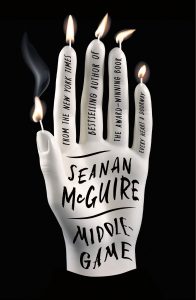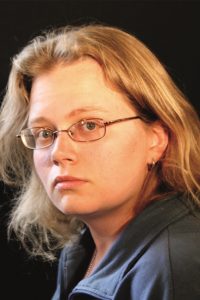Seanan McGuire Guest Post–“Not a Prison”
What’s a genre, anyway? Some have very firm, rigid rules, and deviation is so easy that it’s easier to say what isn’t part of the genre than what is. The dictionary definition states that genres have socially agreed upon conventions, developed over time (this is why, for example, the goalposts of science fiction and urban fantasy are forever moving).
Well, we know when something isn’t part of a genre. HEA (short for “happily ever after”) is a required component of the Romance genre. Many works which contain romance or romantic elements are not Romance novels, and don’t even come close to checking the necessary boxes to qualify as truly in-genre. Science fiction requires a certain speculative element, so even though a fully literal, factual account of my daily life would seem like science fiction to my childhood self, that account would not truly be science fiction today. Fantasy requires an element of the fantastical, magic or impossible creatures or other improbabilities. Fantasy and Horror are very much “sister genres,” separated more by mood than content. The difference between a Fantasy unicorn and a Horror unicorn is the amount of gore on its pretty spiral horn.

And therein lies part of the problem. Because some genres are separated by mood rather than strict rules, it can be hard to say where something should be properly classified. And people can take their genres very seriously indeed. Something that was perfectly acceptable when it was being read as Fantasy is rejected when it turns out to be secret Science Fiction. Westerns are dropped when they reveal themselves as Romance. And so on.
I can’t blame people for doing this. At its best, genre is like a recipe. It tells the person who’s about to order a dish (or a narrative) roughly what they can expect from the broad strokes. If I pick up a Romance novel, it’s because I want that happily ever after. I want it to be earned, absolutely, but I want to know that if I stick it out, I’m going to get what I came for, possibly with a few specific side dishes that I also ordered from the options on the menu. I don’t want my Romance to suddenly unmask itself as New Weird Horror, a subgenre that I have historically enjoyed very much, but which tends to contain more sexual assault than the sort of romances I usually elect to read.
Genres can get as specific as the tags on a fanfic website, and I love them for it. Sometimes what I want isn’t just Urban Fantasy (a genre which is regularly confused with its cousin, Paranormal Romance, to the detriment of both genres), but Urban Fantasy About Vampires Without Erotic Elements. And when someone wants something, they really want it. I react very poorly to a book whose twist is “a-ha, you thought you were reading one thing, when really, you were reading something else entirely, whose rules were altogether different!” My first book as Mira Grant, Feed, was science fiction with horrific elements. People who read it expecting horror were, by and large, very disappointed in what science fiction readers found to be a fun and engaging story.
This is where marketing comes to the party. It’s the job of marketing and presentation to make it glaringly apparent what genre or subgenre a work falls into. “Genre-defying” is a label that people tend to use when they don’t want to pin themselves down to a set of expectations, and will often lead me to reject a book for something that’s more upfront about the reading experience it wants to offer me. “This is not strictly one of the big main genres” doesn’t mean “genre-defying.” It can mean “biohorror” or “paranormal romance,” or, in one fun blender-party case, “Christian vampire horror Western.” All those words bring rules to the party, and once the rules are lain out for everyone to understand and enjoy, that’s when we can get the party started.
The other big caution I would put out there where genre is concerned is that an author name is not a genre. Stephen King has written some incredible, non-speculative literary fiction. Charlaine Harris shines brightest in her cozy mysteries. No one is limited in the stories they can tell, however much we may sometimes think they are.
Genre is a tool and a gift, not a prison.

Seanan McGuire is the author of the October Daye urban fantasy series, the InCryptid series, and other works. She also writes darker fiction as Mira Grant. Seanan lives in Seattle with her cats, a vast collection of creepy dolls and horror movies, and sufficient books to qualify her as a fire hazard. She was the winner of the 2010 John W. Campbell Award for Best New Writer, and in 2013 she became the first person ever to appear five times on the same Hugo ballot.





